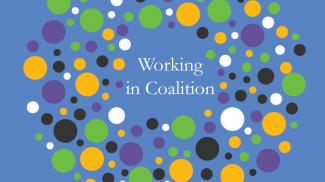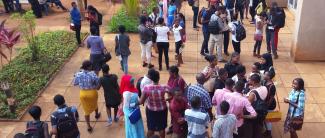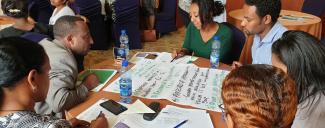Working in coalition
We talk a lot about ‘working in coalition’, and it forms the theme of our annual review of 2021, but what do we mean by the phrase and what difference can working in coalition make to improving equity? INASP's Executive Director John Young discusses.
Views from the Board
Evolving to support equitable knowledge ecosystems in 2022 and beyond
At the end of last year Jo Beall handed over the reins as Chair INASP’s Board of Trustees to Lizbeth Navas-Aleman. As we start a new year with a new board and new approaches to working and delivering INASP’s strategy, in this blog post, Jo shares some reflections from her six years with INASP and her hopes for the coming year and beyond.
And, in the video below, Lizbeth shares her reflections from her first few months as INASP's Chair.
A renewed focus with equity at its heart
The ways in which research quality and research impact are defined and measured are deeply embedded in practices and concepts derived from the Global North. Drawing on examples from the Global South, Jon Harle argues that a fundamental shift is required that understands the value of research – and the institutions producing it – according to the contexts in which knowledge is needed, produced and used.
Over the past year INASP and partners have continued to work together to improve equity in research and knowledge ecosystems, with three priorities: supporting Southern institutions to strengthen their research and teaching; using our digital expertise and platforms to do this; and ensuring that gender equity is at the heart of all that we do. In our annual review of 2021 we share highlights from across our work.
Harnessing digital platforms and digital learning
The past couple of years have highlighted the important role of digital platforms and digital learning in improving equity of opportunities for researchers, students and others to develop skills, network with others and participate in the global knowledge ecosystem. Building on INASP's long experience in this area, in 2021, more than 7,500 early-career researchers, as well as journal editors and university lecturers and students, gained valuable skills for their jobs through digital platforms and digital learning offered by INASP and partners. Last year we also worked with others to increase understanding about how digital technologies are used in research and higher education in low- and middle-income countries.
Supporting researchers to thrive
Supporting Southern research and Southern researchers has been central to INASP's work for many years, through INASP's AuthorAID project. Over the course of 2021 we worked to understand better the needs of early-career researchers in the Global South and enabled more opportunities for research collaboration and engagement thanks to our AuthorAID community model. We helped the Research4Life access initiative to understand the needs of researchers and librarians in low and middle-income countries through an extensive user review. And our work last year continued to support the use of evidence in policy making, including via the SEDI and DAP programmes. Our support to Southern research is underpinned by our digital platforms and digital learning and by our work to help improve gender equity in research.
Transforming higher education
Through the Transforming Employability for Social Change in East Africa (TESCEA) partnership, which finished at the end of 2021, 565 university teaching staff in Tanzania and Uganda developed their skills in transformative teaching and learning and can now support colleagues and scale change further across institutions. The project enabled new relationships to be forged between universities and their communities, business, and governments. As a result of TESCEA, 91% of academics trained now use gender-responsive pedagogy and 80% use critical thinking techniques in their teaching, leaving students better equipped with the skills they need for work and life beyond university.
We also supported the Sierra Leone-led Assuring Quality Higher Education in Sierra Leone (AQHEd-SL) project by working alongside academics in Sierra Leone to develop training in critical thinking skills that is appropriate to the national context and enabling a community of local experts in critical thinking skills development to be established. We helped the Sierra Leone-led project create a repository of frameworks and resources to ensure sustainability.
Centring gender
Striving for improved gender equality underpins all of INASP's work. In our higher education work, gender-responsive pedagogy and gender sensitisation play central roles in the model developed in the Transforming Employability for Social Change in East Africa partnership. Through the Global Platforms for Equitable Knowledge Ecosystems programme, we have supported local partners in Uganda and Ethiopia to establish national networks to support gender equity in research.
Thank you to all the AuthorAID researchers and our partners in the TESCEA, GPEKE and AQHEd-SL programmes for working with us in the activities discussed in this annual review - and many others - and for the images shared in this review.
Thank you also to all who provide funding to enable this work to continue, particularly FCDO for funding the SPHEIR projects and Sida for funding GPEKE.
For our 2022 Annual Review see here
For more about INASP, sign up for our newsletter and blog post alerts, and follow us on Twitter, LinkedIn and Facebook.






